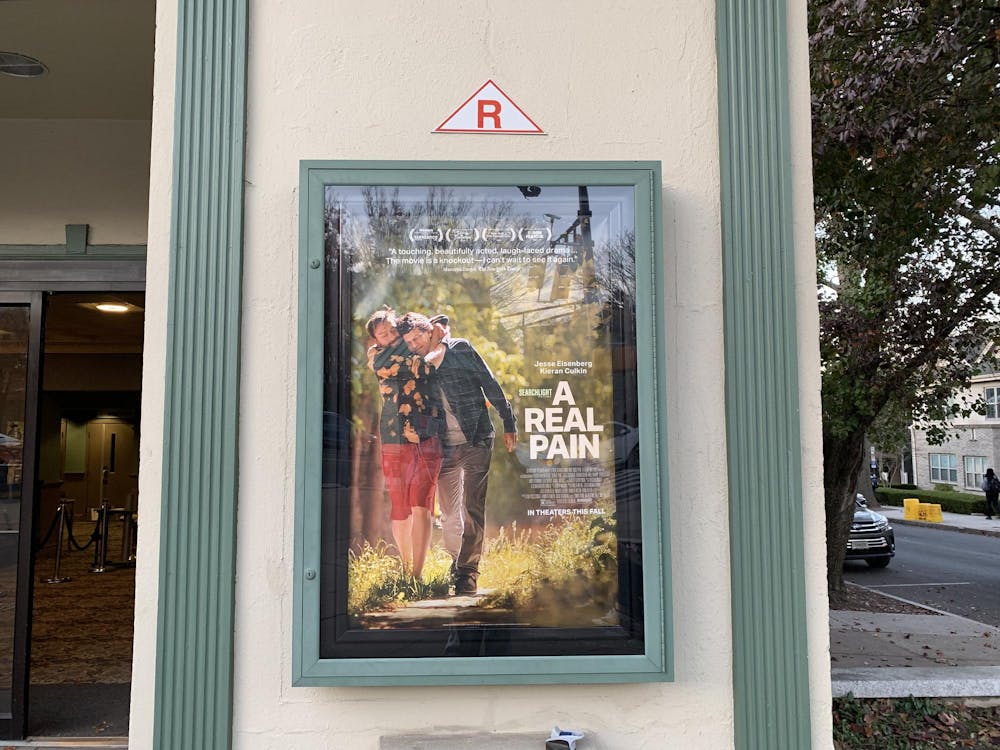“A Real Pain,” written and directed by Jesse Eisenberg, prompts its viewers and characters to consider how true pain manifests. The film centers around two first cousins, David and Benji, portrayed by Eisenberg and Kieran Culkin respectively, who were once basically brothers but have drifted apart over time. Culkin plays the complicated Benji with abject grief and brass unpredictability, while Eisenberg displays grief with stilted self-consciousness that never entirely diminishes the emotions that the character is feeling. In the wake of their beloved grandmother’s death, the cousins embark on a Holocaust remembrance tour around Poland. David and Benji struggle with their grief in different ways.
As the tour moves across different cities, David and Benji begin to grow closer to each other, but never quite close enough. David, a straight-laced, awkward, family man, cannot save the tortured Benji from himself, and Benji resents his cousin for that. Benji even harbors resentment for the other tourists and the tour guide. He detests that people, specifically Jewish people, have cut themselves off from their ancestors’ true pain. He accuses the informed, non-Jewish tour guide of being robotic in his delivery of facts about the Holocaust. Benji believes the pain has become contained and developed into a non-taxing experience; the tour guide and the other tourists are not outwardly exhibiting the tremendous pain that Benji carries with him every second of every day, leading to tense moments during the trip.
Benji’s outbursts are shown more through David’s perspective, even though both cousins are protagonists. David’s clear struggles with his cousin’s unpredictable behavior could have made Benji unlikeable. Yet, the film and its characters handle Benji with much care and sympathy, leading viewers to feel the same. Eisenberg expertly crafted a deeply troubled but sympathetic character, one that even the most exasperated tourist on the tour eventually starts to root for. Benji is rigid in his beliefs about how grief should take form, leading to various outbursts and lectures directed towards other tour members, the tour guide, and David. However, Benji has a fragility undermining his rigidness. There is a persistent sense that Benji can dramatically explode at any moment, and David will be forced to pick up the pieces.
For a movie mostly driven by its characters and at risk of moving slowly at certain points, this tension between the cousins made the film more enjoyable by ramping up the stakes.
“A Real Pain” is both a drama and a comedy. Throughout the hour-and-thirty-minute film, David’s dry humor and Benji's spontaneous, unencumbered quips elicited more than a few laughs in the quarter-full Garden Theater. One notable line is when Benji very bluntly says to his fellow tourists that they are on a “geriatric Polish tour,” moments after he discusses the horrors of the Holocaust. The impulsive way Culkin delivered lines made for many laughter-inducing moments. In the last part of the film, drama and sadness battle the comedic aspects of the film and win. While levity is present in the film, and Eisenberg and Culkin are both well-versed in comedic timing, the questions about emotional pain that the film explores shine when the characters are clearly grieving.
One of the film’s most painful yet brilliantly realistic elements comes forth when Eisenberg provides no concrete conclusion to Benji’s grief. As the cousins sleep in adjacent twin beds in cramped Polish hotel rooms, they should naturally become closer. However, while the cousins reconnect during weed-filled nights and countryside train mishaps, they never quite return to one another’s orbit.
For instance, David and Benji wear some form of blue and red throughout the film. On the first day of the tour, David is wearing all blue while Benji is wearing all red. Over the next few days, they both wear a mix of blue and red. On the last day of the tour, David is in all red, and Benji is in all blue. While Eisenberg never portrayed the cousins as close as brothers during the trip, David and Benji briefly bond through their shared grief and the warm memories of their past relationship. For a moment, they are united in their mission to honor their grandmother, and their mingling color palette reflects that.
However, the film ultimately reminds viewers that the cousins are like fire and ice because of their different approaches to grief and their opposing life paths. Viewers see a spectacle of Benji’s real pain and a glimpse of David’s before the film ends. The last shot is the same as the first, with Benji sitting in a crowded airport terminal, eliciting gasps from Garden Theater viewers. The unresolved finish originally felt shocking and dissatisfying yet portrayed the ending. Benji’s point has been partially proven, as he never properly felt the grief and pain of the people around him. The film vehemently denies the idea that pain can be put into a box and easily examined.

At the end, there is the sense that nothing has changed, but everything might. Benji might never heal from his grandmother’s death. The film does not give any real indication that he will, but that is the beauty of “A Real Pain.” It also argues Benji is wrong in thinking there is a “right” way of feeling pain. The decision to leave the turmoil of the film unresolved is ambitious on Eisenberg’s part. Although the direction of the film could be frustrating, it ultimately paid off: an unsatisfactory but necessary conclusion to a heartfelt, well thought-out film. Pain is bloody and messy, unpredictable and expected. All pain is real pain.
Meredith Sneed is a contributing writer for The Prospect from Savannah, Ga. She can be reached at ms1290@princeton.edu.









